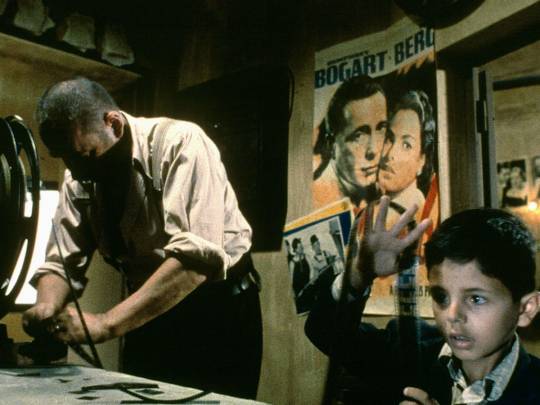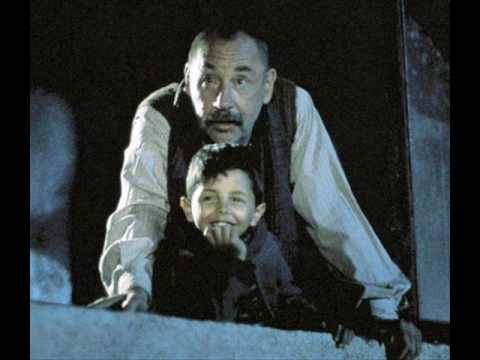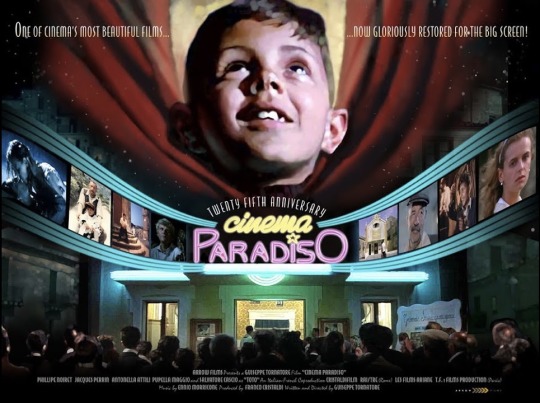#agnese nano
Explore tagged Tumblr posts
Text

6 notes
·
View notes
Text

The feels would have hit harder if Alfredo knew Elena had hidden the note and personally intervened to intercept the note, only to give it back to Toto, with his apologies, should Toto ever return.
Cinema Paradiso (Italian: Nuovo Cinema Paradiso) is a 1988 coming-of-age drama film written and directed by Giuseppe Tornatore. This Italian-French co-production stars Philippe Noiret, Jacques Perrin, Leopoldo Trieste, Marco Leonardi, Agnese Nano and Salvatore Cascio.
#cinema paradiso#nuovo cinema paradiso#italian#italy#coming of age#philippe noiret#jacques perrin#leopoldo trieste#marco leonardi#agnese nano#salvatore cascio#italian cinema#giuseppe tornatore#movie review#1988
4 notes
·
View notes
Photo

Philippe Noiret and Salvatore Cascio in Cinema Paradiso (Giuseppe Tornatore, 1988)
Cast: Philippe Noiret, Salvatore Cascio, Marco Leonardi, Jacques Perrin, Agnese Nano, Antonella Atti, Enzo Cannavale, Isa Danieli, Leopoldo Trieste, Roberta Lena, Nino Terzo, Leo Gullotta, Tano Cimarosa, Nicola Di Pinto. Screenplay: Giuseppe Tornatore, Vanna Paoli. Cinematography: Blasco Giurato. Production design: Andrea Crisanti. Film editing: Mario Morra. Music: Ennio Morricone.
Will today's kids feel sentimental about the multiplexes in which they see movies, the way I feel about the small-town theaters where I grew up, the places where I learned to love movies? I have my own lost cinema paradises, so I should be the right audience for Cinema Paradiso, with its tribute to a bygone era of moviegoing. Tornatore's movie has some good things going on, including the performance of Philippe Noiret as Alfredo, and the wonderful rapport between Noiret and young Salvatore Cascio as Toto. Leopoldo Trieste's performance as the censorious Father Adelfio is also a delight, and ending the film with Alfredo's assemblage of the kissing scenes the priest made him excise is a masterly bit. But once Toto grows up to be the lovestruck teenager Salvatore (Marco Leonardi), I begin to lose interest, as Tornatore's screenplay lards on more and more sentimentality. I've seen the 155-minute version twice now, though I have yet to see the 173-minute "director's cut" of the film, in which, I am told, the grownup Salvatore (Jacques Perrin) is reunited with his teen love Elena (Agnese Nano), now grown up and played by Brigitte Fossey. Frankly, I don't much want to: The 155-minute version seems overlong as it is. Cinema Paradiso is beloved by many, and often makes lists of people's favorite foreign-language films, but I find it thin and conventional.
9 notes
·
View notes
Text




#ProyeccionDeVida
🎥 Cine Superba, presenta:
🎬 “CINEMA PARADISO” [Nuovo Cinema Paradiso]
🔎 Género: Drama / Comedia / Cine dentro del Cine / Amistad / Película de Culto

⏰ Duración: 155 minutos
✍️ Guión: Giuseppe Tornatore
🎼 Música: Ennio Morricone
📷 Fotograf��a: Blasco Giurato

🗯 Argumento: Historia de amor por el cine de Salvatore, un niño de un pueblecito italiano en el que el único pasatiempo es ir al cine. Subyugado por las imágenes en movimiento, el chico cree ciegamente que el cine es magia; pero, un día, Alfredo, el operador, accede a enseñarle al pequeño los misterios y secretos que se ocultan detrás de una película. Salvatore va creciendo y llega el momento en el que debe abandonar el pueblo y buscarse la vida. Treinta años después recibe un mensaje, en el que le comunican que debe volver a casa.

👥 Reparto: Salvatore Cascio (Salvatore Di Vita), Philippe Noiret (Alfredo), Marco Leonardi (Salvatore Di Vita), Jacques Perrin (Salvatore Di Vita), Agnese Nano (Elena Mendola), Antonella Attili (Maria), Isa Danieli (Anna), Leopoldo Trieste (Padre Adelfio) y Enzo Cannavale (Spaccafico)
📢 Dirección: Giuseppe Tornatore

© Productoras:Les Films Ariane, Cristaldifilm, TF1 Films Production, RAI 3 & Forum Picture
🌏 Países: Italia-Francia
📅 Año: 1988

📽 Proyección:
📆 Jueves 03 de Octubre
🕗 8:00pm.
🏡 Superba (av. Petit Thouars 2884 - San Isidro)

🚶♀️🚶♂️ Ingreso libre
🥘Consumo Mínimo🍺🍨🍮🍰
1 note
·
View note
Text
Cine “Cinema Paradiso”
Título original: Nuovo Cinema Paradiso Año: 1988 Duración: 155 minutos País: Italia Dirección: Giuseppe Tornatore Guion: Giuseppe Tornatore Música: Ennio Morricone y Andrea Morricone Fotografía: Blasco Giurato Montaje: Mario Morra Vestuario: Beatrice Bulgari Protagonistas: Philippe Noiret, Salvatore Cascio, Marco Leonardi, Antonella Attili, Jacques Perrin, Agnese Nano y Brigitte…

View On WordPress
0 notes
Text
Agnese Nano & Nicola Farron in L'edera (1991/92). ❤️ [which series theme song was "I ricordi del cuore" by Amedeo Minghi.]❤️

2 notes
·
View notes
Photo

Nuovo Cinema Paradiso ist einer von diesen Filmen, gegen die ich manchmal etwas misstrauisch bin, weil alle sagen, er sei “soo schön”. Aber in Verlegenheit mit dem versprochenen Gedenkfilm für Jacques Perrin, dachte ich, ich probiere es jetzt mal aus. Fazit: Das Misstrauen ist natürlich total berechtigt und es ist soo schön. Besonders das Ende.

(x)
#Nuovo Cinema Paradiso#Jacques Perrin#Philippe Noiret#Salvatore Cascio#Marco Leonardi#Agnese Nano#Antonella Attili#Pupella Maggio#Film gesehen#Giuseppe Tornatore#Ennio Morricone
3 notes
·
View notes
Photo


@tcmparty live tweet schedule for the week beginning Monday, September 06, 2021. Look for us on Twitter…watch and tweet along…remember to add #TCMParty to your tweets so everyone can find them :) All times are Eastern.
Monday, Sept. 06 at 8:00 p.m. CINEMA PARADISO (1989) A boy coming of age in WWII Italy develops a lifelong love affair with movies.
Friday, Sept. 10 at 6:00 p.m. BEYOND THE POSEIDON ADVENTURE (1979) Rival salvage parties enter an upside down ocean liner in search of treasure.
#schedule#giuseppe tornatore#philippe noiret#antonella attili#enzo cannavale#marco leonardi#agnese nano#irwin allen#veronica hamel#mark harmon#angela cartwright#slim pickens#jack warden#karl malden#michael caine#peter boyle#sally field#telly savalas#shirley jones#shirley knight#1970s#1980s#disaster flicks#classic movies#classic film#turner classic movies#tcm party#live tweet
14 notes
·
View notes
Photo










Cinema Paradiso (1988) dir. Giuseppe Tornatore
#cinema paradiso#nuovo cinema paradiso#giuseppe tornatore#philippe noiret#jacques perrin#agnese nano#film#filmedit#movie edit#film edit#movieedit#movie#movie screenshots#80s#1988#80s movie#80s cinema#cinema#cinemetography#cinemaphotography#cinema photography#mine#film stills#i still shoot film
270 notes
·
View notes
Photo










Cinema Paradiso (1988) Director - Giuseppe Tornatore, Cinematography - Blasco Giurato "Living here day by day, you think it's the center of the world. You believe nothing will ever change. Then you leave: a year, two years. When you come back, everything's changed. The thread's broken. What you came to find isn't there. What was yours is gone. You have to go away for a long time... many years... before you can come back and find your people. The land where you were born. But now, no. It's not possible. Right now you're blinder than I am."
#scenesandscreens#cinema paradiso#Blasco Giurato#Giuseppe Tornatore#Antonella Attili#Enzo Cannavale#Isa Danieli#Leo Gullotta#Marco Leonardi#Pupella Maggio#Agnese Nano#Leopoldo Trieste#Salvatore Cascio#Nicola Di Pinto
44 notes
·
View notes
Text

#poster#philippe noiret#salvatore cascio#marco leonardi#agnese nano#jacques perrin#leopoldo trieste#isa danieli#enzo cannavale#pupella maggio#leo gullotta#brigitte fossey#antonella attili#Nicola Di Pinto#Tano Cimarosa#cinema paradiso#1980s#Giuseppe Tornatore#Blasco Giurato
0 notes
Photo

4 notes
·
View notes
Photo




#cinema paradiso#salvatore di vita#marco leonardi#elena mendola#agnese nano#mine#my set#my gifs#my edit#otp projection#jerk-bending#do you not see it?#marco looks a lot like steven#hence the elizabeth taylor ad
206 notes
·
View notes
Photo

Movie Review: Cinema Paradiso (1988)
"A Timeless Film for People Who Love Cinema"
⭐️⭐️⭐️⭐️ 4/5
Cinema Paradiso
1988
Director: Giuseppe Tornatore
Writers: Giuseppe Tornatore, Vanna Paoli, Richard Epcar
Starring: Philippe Noiret, Jacques Perrin, Marco Leonardi, Salvatore Cascio, Agnese Nano, Antonella Attili, Enzo Cannavale, Isa Danieli, Leo Gullotta, Pupella Maggio
Genre: Drama, Romance
Country: Italy, France
Giuseppe Tornatore’s ‘Cinema Paradiso’ is exceptionally heartfelt and truly depicts the wonders of movies. It follows the coming-of-age story of Salvatore “Toto”, a local boy from Giancaldo, Sicily, Italy and how he developed his love for films at a young age under the influence of Alfredo, a projectionist at Cinema Paradiso. Later on, Toto learned the process of creating that work of art which is called ‘film-making’, cultivated his passion and became successful in his profession as a film director.
Cinema Paradiso is a story of love, friendship, family and one’s pursuit of one’s dreams. The growing platonic relationship between a mentor and a mentee, a local boy and his love for his natal home and the budding interest that eventually grew as a love for films. The characters were exquisitely portrayed by the actors as if it were all natural—from the young and heedless Toto to the charming adolescent Salvatore and eventually the big-shot director that he became, Toto’s mother, Alfredo, and other characters; their acting was truly rich.
This movie made me feel a lot of emotions and I even found myself shedding a tear or two. Some scenes were sentimental such as when Salvatore came back to Giancaldo as an adult to attend Alfredo’s funeral. There was a feeling of nostalgia—for childhood, for youth, feelings, moments, people and places that are now just mere memories. It made me realize how one’s decisions and choices can make a great impact in our life and can alter our path anytime. So whatever we decide to pursue later on in life, we should make sure that we love it and we enjoy doing it. Sometimes, when we are in the path of chasing our dreams, we tend to sacrifice some things and lose some people along the way. That’s okay, it’s all part of life. We should accept the fact that people come and go and despite that, life should continue to go on because it does not stop for anyone. It is amazing how works of art such as films can make us feel a surge of emotions. Personally, something I am thankful to have experienced the magic of cinema in my life. All in all, this is a beautiful movie. A must watch especially for movie connoisseurs, filmmakers, film enthusiast, film-buffs and lovers of the arts.
4 notes
·
View notes
Text
Cinema Paradiso (1988) Review
Cinema Paradiso (1988) Review
Salvatore Di Vita a filmmaker recalls his childhood and teenage years where he fell in love with movies at the cinema in his small village along with the amazing friendship he shared with Alfredo the projectionist at the cinema.
⭐️⭐️⭐️⭐️⭐️
*Original Title – Nuovo Cinema Paradiso*
(more…)
View On WordPress
#1988#Agnese Nano#Angela Leontini#Angelo Tosto#Antonella Attili#Beatrice Palme#Cinema Paradiso#Concetta Borpagano#Enzo Cannavale#Franco Catalano#Giorgio Libassi#Giuseppe Pellegrino#Giuseppe Tornatore#Ignazio Pappalardo#Isa Danieli#Italian#Jacques Perrin#Leo Gullotta#Leopoldo Trieste#Marco Leonardi#Margherita Mignemi#Mariella Lo Giudice#Mimmo Mignemi#Nellina LAgana#Nicola Di Pinto#Nino Terzo#Nuovo Cinema Paradiso#Philippe Noiret#Pupella Maggio#Review
0 notes